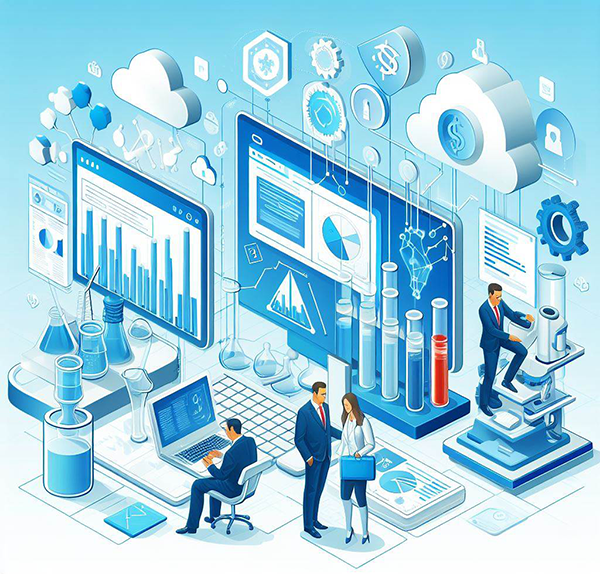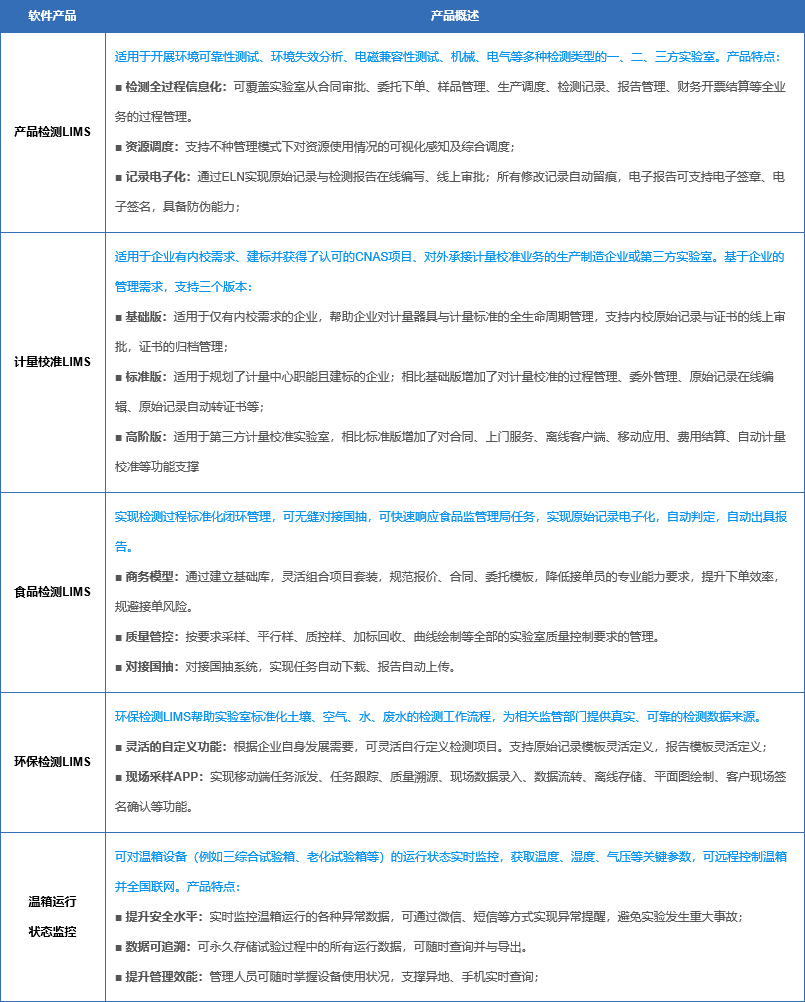How to realize the integration of business and laboratory informatization of third-party testing laboratories
Released:2023-12-01
With the advancement of science and technology and the continuous development of global trade, third-party testing laboratories play an increasingly important role in ensuring product quality and safeguarding consumer rights. In this context, how to realize the integration of business and laboratory informatization and further improve the efficiency and accuracy of testing has become a problem worth exploring.

1. The necessity of integrating business and laboratory informatization
1. Improve testing efficiency: Through information technology, laboratories can automatically process testing data, reduce manual operation, reduce error rate, and improve testing efficiency.
2. Improve data accuracy: Information technology can reduce the impact of human factors on data, improve the accuracy of data, and provide more reliable analysis results for laboratories.
3. Optimize resource management: Through the information platform, the laboratory can realize the unified management of equipment, personnel, materials and other resources, optimize resource allocation, and improve resource utilization efficiency.
4. Strengthen quality control: information technology can realize the quality control of the testing process, find and solve quality problems in a timely manner, and improve the overall quality level of the laboratory.
5. Improve customer service level: Through the information platform, the laboratory can better meet customer needs, provide faster and more accurate testing services, and improve customer satisfaction.
Second, the difficulty of the integration of business and laboratory informatization
However, despite the continuous development of the business of third-party testing laboratories, there are still some difficulties in the integration of business and laboratory informatization:
1. Difficulty in laboratory equipment management: Due to the wide variety and large quantity of laboratory equipment, equipment maintenance and management have become a difficult problem.
2. Difficult to trace the inspection data: Due to the large amount of data generated during the inspection process, how to ensure the accuracy and traceability of the data is a major challenge.
3. Non-standard business processes: Non-standard laboratory business processes can easily lead to operational errors and low efficiency.
4. The information system is not unified: The information system used by various business departments and laboratories is not uniform, resulting in a serious phenomenon of information islands.
3. Strategies to realize the integration of business and laboratory informatization
In order to solve the above problems and realize the integration of business and laboratory informatization, the following strategies are worth paying attention to:
1. Establish a unified laboratory equipment management system: Through the introduction of advanced equipment management system, the equipment is managed in a unified manner, including equipment procurement, maintenance, scrapping, etc., so as to improve the efficiency of equipment use and maintenance quality.
2. Implement data management system: adopt advanced data management system to manage the data generated in the testing process in a unified manner, realize the automatic collection, processing, storage and analysis of data, so as to improve the quality and traceability of data.
3. Optimize business processes: Reduce operational errors and improve work efficiency by sorting out business processes and standardizing operation steps and processes. At the same time, automated systems, such as automated sample management systems, are introduced to further optimize business processes.
4. Establish a unified information platform: integrate the information system of various business departments and laboratories to establish a unified information platform to realize information sharing and data exchange, so as to eliminate the phenomenon of information islands.
5. Improve the quality of personnel: strengthen personnel training and quality improvement, establish a professional team that understands both business and informatization, and provide talent guarantee for the integration of business and laboratory informatization.
6. Introduce artificial intelligence technology: Use artificial intelligence technology to conduct in-depth mining and analysis of data to provide strong support for laboratory management and business decision-making.
7. Establish a sound quality management system: Introduce an internationally recognized quality management system, such as ISO/IEC 17025, etc., and establish a complete laboratory management and quality control system to ensure the accuracy and reliability of testing data, improve customer satisfaction, and also help enhance the international competitiveness of the laboratory.
Through the implementation of the above measures, the integration of business and laboratory informatization can be effectively realized, the management level and testing efficiency of the laboratory can be improved, and the accuracy and reliability of the testing data can be ensured, so as to better serve the product quality control and consumer rights protection.
Fourth, Jiuding software intelligent laboratory information service solutionAfter years of industry accumulation, Jiuding has independently developed 10 software products with the metrology and testing industry as the core and the general management of enterprises as the supporting support, which are widely used in environmental reliability, electromagnetic compatibility, chip testing, measurement and calibration, food testing, environmental protection testing, chemical analysis and other professional fields, helping the digital construction of third-party testing institutions' laboratories.

Related
Construction of digital laboratories for environmental testing institutions: with the help of science and technology, we will create a green future
Today, with the rapid development of science and technology, digital laboratories have become the core strength of environmental protection testing institutions. It not only improves the efficiency and accuracy of detection, but also provides more accurate data support for environmental protection.
Digitalization Drives Innovation: Exploring the Digital Transformation of New Energy Battery Manufacturing Enterprise Laboratories
With the rapid development of science and technology, digital transformation has become an important driving force for innovation and development in all walks of life. As an important pillar of green energy in today's world, the new energy battery manufacturing industry is facing unprecedented opportunities and challenges. The practice and application of digital transformation in new energy battery manufacturing enterprises is of great significance to enhance the core competitiveness of enterprises and promote the sustainable development of the industry.
Policy interpretation of the "Guiding Opinions on Promoting the Improvement of Enterprises' Measurement Capabilities".
In recent years, various competent authorities have issued many policies to encourage enterprises to improve their measurement management capabilities, such as the State Administration for Market Regulation and the Ministry of Industry and Information Technology jointly issued the "Guiding Opinions on Promoting the Improvement of Enterprises' Measurement Capabilities". The document proposes a number of measures, including strengthening the accumulation and application of enterprise measurement data, and building an enterprise measurement technology innovation ecology. Under the guidance of this important document, the company will usher in a clearer development direction in strengthening the construction of the measurement management system. This article will interpret the key provisions of the Guiding Opinions on the basis of them in combination with the policy guidance emphasized therein.
Pain points and LIMS solutions for rail transit testing institutions
With the advancement of science and technology and the implementation of digital policies, the rail transit industry is facing unprecedented challenges and opportunities. Especially in the field of equipment measurement management, the traditional model can no longer meet the needs of modern enterprises. In response to this trend, more and more rail transit companies are looking for innovative solutions. This paper will discuss the application of digital solutions in the management of metrology equipment in rail transit enterprises, and focus on the value and implementation of laboratory information management system (LIMS).
How to realize the integration of business and laboratory informatization of third-party testing laboratories
With the advancement of science and technology and the continuous development of global trade, third-party testing laboratories play an increasingly important role in ensuring product quality and safeguarding consumer rights. In this context, how to realize the integration of business and laboratory informatization and further improve the efficiency and accuracy of testing has become a problem worth exploring.
How to choose a laboratory management system (LIMS) for food processing enterprises
With the rapid development of the food processing industry, the demand for laboratory management systems is also increasing. Laboratory management systems (LIMS) are an indispensable part of food processing companies as they can effectively improve the efficiency and accuracy of laboratories and reduce costs. However, how to choose the right LIMS system for your business?










